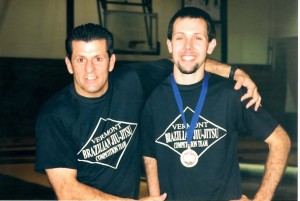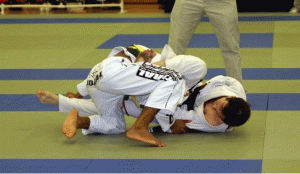Author: Aaron Lapointe, Carlson Gracie Jiu-Jitsu Black Belt
One of the best things about jiu-jitsu is that it can work for almost anyone as long as you put in the time and effort and make the proper adjustments. I’ll use myself as an example. Even though my right arm is fully paralyzed, I was still able to achieve my black belt in jiu-jitsu and compete in some of the world’s most prestigious tournaments. Sure I was fortunate to have learned from some of the biggest legends in the sport; I will talk about them in a separate write-up. Even so, a large part of my success was directly related to the fundamentals of jiu-jitsu and the inherent ability we all have to overcome physical and emotional roadblocks.
Sometimes an apparent limitation is a blessing in disguise because it pushes you to find the simplest and most efficient way of doing something. Whereas some people might perform a technique by following steps 1 through 5, someone who is unable to do steps 3 and 4 might discover that the same end result can be achieved in fewer or alternative movements. Because the margin for error is much smaller when you have a disability, your movements need to be timely and precise. In addition, a significant limitation in one area can help promote a major strength in another. Because I was unable to use my right arm to stop people from passing my guard, I developed excellent hip movement, a strong grip, and proficient use of my hooks. I also had to develop a strong base and keen sense of balance so I would not be easily swept to my right. Most importantly, I acquired an advanced understanding of the basic principles that make jiu-jitsu work. For example, sweeps work because you disrupt a person’s base and prevent him or her from reestablishing it, not because you put your foot in a certain position or grab the collar in a specific way.
Some people think my jiu-jitsu would be even better if I could use both arms. I’m not so sure about that. In fact I kind of doubt it. The only thing I do know is that my jiu-jitsu would be different, and most likely those areas that are essential to my game (e.g., hip movement) would be much less developed. Not only did my disability help shape my jiu-jitsu, but it also motivated me to train hard and establish a “never say die” attitude. Unfortunately, this drive and attitude was not always a good thing since the playful side of jiu-jitsu sometimes escaped me. Nowadays I train jiu-jitsu because it’s fun, not because I feel the need to prove myself on the mat.
If you train jiu-jitsu long enough you’re bound to roll with someone who has a physical disability. Heck, we all have physical limitations of one kind or another. Some are just more obvious than others. Regardless of what that limitation is, I offer these words of advice. Help that person work around his or her disability, but don’t feel the need to try and simulate it when you spar. If your partner only has one arm you don’t need to roll with one arm tucked in your belt. If your partner is blind you don’t need to roll with your eyes closed. If you outweigh your partner by 75 pounds, you don’t need to jump in the sauna. You get my point. Hopefully, many of you out there already adjust your games accordingly depending on who you are rolling with. Generally speaking, you don’t spar the same way with everyone, and if you do you may want to reconsider that strategy. If your partner has a physical limitation, refrain from making any special accommodations without asking first. Don’t worry, that person will be just fine. Jiu-jitsu will make sure of it!
Anyone with questions or comments for Aaron can reach him at aaronlapoi@yahoo.com.

